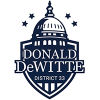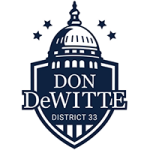Pritzker continues to rule unilaterally
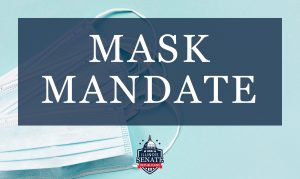 Since the Governor’s announcement on August 4 of new Pre-K-12 mask mandates and mandatory vaccines for some classifications of state workers, my office has been flooded with phone calls and emails from angry constituents. Most are asking what I am going to do about the Governor’s latest mandates and executive orders. Unfortunately, the courts have ruled that Governor Pritzker is within his rights to issue and extend these executive orders. But court rulings aside, it is inexcusable that the legislature is not being consulted before new executive orders and mandates are issued.
Since the Governor’s announcement on August 4 of new Pre-K-12 mask mandates and mandatory vaccines for some classifications of state workers, my office has been flooded with phone calls and emails from angry constituents. Most are asking what I am going to do about the Governor’s latest mandates and executive orders. Unfortunately, the courts have ruled that Governor Pritzker is within his rights to issue and extend these executive orders. But court rulings aside, it is inexcusable that the legislature is not being consulted before new executive orders and mandates are issued.
Throughout the pandemic, I have urged the Governor to include the legislative branch in decisions regarding COVID-19. Those calls for joint decision-making from my colleagues and me continue. But please understand, there are only three people who can call the legislature back into session: Governor Pritzker, Senate President Don Harmon, and House Speaker Chris Welch. Both Harmon and Welch seem perfectly content to allow the Governor to continue ruling via executive order.
I believe it is wrong to remove legislators from pandemic decision-making. By sidelining legislators, there is no opportunity for Illinoisans’ voices to be heard through their elected Senators and Representatives. I will continue to push for legislative involvement in future COVID-19 decisions that affect our communities, and will continue to encourage our local schools, businesses and restaurants to make decisions as they are able that are in the best interests of those they serve, and which reflect local community values.
Take my summer survey!
My comprehensive 2021 End of Session report landed in mailboxes throughout the 33rd District last week and this week. In addition to highlighting some achievements and challenges of the recent spring legislative session, the document includes a short, seven-question survey. This survey is also available digitally. I hope everyone will take a few minutes to complete the survey, because the responses help me take votes in Springfield that are representative of the opinions within the 33rd District. You can access the digital survey here.
Summer events continue in 33rd District
My summer Coffee & Conversation tour continues next week with a Tuesday, August 10 event in St. Charles. I will be joined by St. Charles Mayor Lora Vitak for an 8:00 AM event at the Arcedium Coffeehouse at 60 Indiana Street. Stop by and say hello if you’re in the area, and if you would like to have a casual conversation about issues that are important to you, Mayor Vitek and I would love to talk with you.
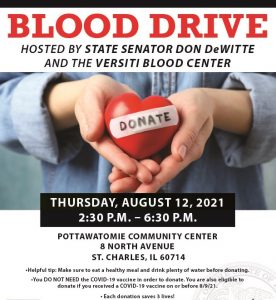 Next week, on Thursday, August 12, I’ll also be hosting a community blood drive in St. Charles. Did you know that every blood donation saves at least three lives? The need for blood donations in northern Illinois is still great, so I am partnering with Versity Blood Center to offer a convenient location for residents of the 33rd District to make a blood donation. Blood donation specialists will be available from 2:30 – 6:30 PM at the Pottawatomie Community Center, 8 North Avenue in St. Charles. If you are in good health, please consider making a life-saving donation of blood at this event. Walk-in donors will be accepted, but reservations are appreciated. To register to donate blood at this event, click here.
Next week, on Thursday, August 12, I’ll also be hosting a community blood drive in St. Charles. Did you know that every blood donation saves at least three lives? The need for blood donations in northern Illinois is still great, so I am partnering with Versity Blood Center to offer a convenient location for residents of the 33rd District to make a blood donation. Blood donation specialists will be available from 2:30 – 6:30 PM at the Pottawatomie Community Center, 8 North Avenue in St. Charles. If you are in good health, please consider making a life-saving donation of blood at this event. Walk-in donors will be accepted, but reservations are appreciated. To register to donate blood at this event, click here.
Other upcoming events include:
- Tuesday, Aug. 24: Traveling Office Hours, Algonquin Public Library, 2600 Harnish Drive, Algonquin, 9:30-11:30 AM
- Thursday, Sept. 16: Cybersecurity and Online Safety Event, 6:30- 8:30 PM, additional details coming soon
- Tuesday, Sept. 28: Traveling Office Hours, Lake in the Hills Village Hall, 600 Harvest Gate, 9:30-11:30 AM
- Tuesday, Oct. 18, Traveling Office Hours, St. Charles Public Library, 1 S. 6th Ave, St. Charles, 9:30-11:30 AM
- Friday, Nov. 12: Senior Fair, McHenry County College, 9:30-11:30 AM, additional details coming soon
- Tuesday, Nov. 16, Traveling Office Hours, Gail Borden Library’s South Elgin Branch, 127 S. McLean Blvd, South Elgin, 10:00-12:00
DeWitte: A reasonable energy compromise exists
This week I published an editorial in the Chicago Sun Times about the majority party’s inability to come to agreement on a comprehensive energy bill that moves Illinois toward a cleaner energy future and also allows the state’s nuclear fleet to remain operational. Here is the text of my op-ed:

Illinois won’t get a clean energy bill until Democrats learn to compromise
By State Senator Donald DeWitte, Aug 5, 2021
Democratic lawmakers in Illinois are used to getting what they want. With strong super-majorities in the Senate and House, they typically don’t have to look beyond their own caucus to move legislation forward. There are many Democrats who value bipartisanship, but they certainly don’t need it to push through most of their legislative initiatives.
When working from within the minority party, compromise is necessary. No Republican Senator can pass a bill without first reaching across the aisle and finding at least 12 Democrats who will support their bill. We must negotiate, find common ground, and recognize that sometimes incremental steps forward are better than no steps forward at all. In conversations with constituents, this respectful “give-and-take” is what the people of Illinois want from their elected officials.
The inability of Democrats to agree on comprehensive clean energy legislation is a prime example of what happens when legislators dig in their heels and refuse to settle for most of what they want rather than all of what they want. This is new territory for the majority party, and in the end, it is energy ratepayers and taxpayers who will suffer the most from their inability to find common ground on a clean energy bill.
Coal-burning plants in southern Illinois are at the crux of the debate. Environmentalists want the plants closed ASAP, while labor unions want those jobs protected, or at least extended. The Prairie State Energy Campus provides coal-based energy to 2.5 million homes, many in the suburbs of Chicago. Municipalities, including St. Charles, Geneva, and Batavia in the 33rd Senate District, are part of a consortium that made a significant financial investment in the Prairie State Energy Campus as a means of providing reliable and affordable energy to residents. Municipalities have long-term bond debt extending as far out as 2042 to finance the delivery of this energy to consumers. Environmentalists know this but don’t seem to care that if this facility is closed prematurely, many communities will have to pay to secure energy elsewhere, while still paying off Prairie State bonds for energy they’re not receiving.
As the majority party continues running in circles trying to find a way to placate environmentalists and organized labor unions, it is clear that the best interests of Illinois energy consumers are not the focal point of these negotiations.
Meanwhile, Exelon has been waiting for a deal to emerge that would allow two nuclear energy plants that currently provide about one-third of the state’s clean, carbon-free energy to remain open. As talks continue to stall, Exelon is taking steps to take nuclear plants in Byron and Dresden offline before the end of 2021.
Through sheer stubbornness, an unwillingness to compromise, and a refusal by Democrats to make a decision that will upset longtime and reliable supporters, we are watching a dangerous and costly game of political chicken. Unless a compromise is reached, nuclear plants that supply extremely clean energy will go offline and Illinois will be forced to turn to less desirable energy production at a higher cost. For Governor Pritzker and legislators aligned with environmental groups, they seem willing to take a giant step backward in Illinois’ clean energy portfolio rather than compromise and extend the lives of coal-burning plants to the point when municipal debt payments expire.
Environmentalists talk about emerging technologies regarding wind and solar generation, yet ignore similar emerging technologies already being funded by the state and federal government that would allow Illinois to become a leader in carbon sequestration and emissions reductions. By embracing these new fossil fuel technologies, Illinois could continue to move forward toward a cleaner energy future, jobs could be saved, and ratepayers could be assured they will continue to get their energy at affordable costs.
It’s time for the Governor and Democrats to stop playing politics by posturing to their political allies. A reasonable compromise exists, and Governor Pritzker and Democratic legislators need to finalize clean energy legislation that benefits all parties, so legislators can return to Springfield and vote on it.
Governor Signs DeWitte Pro-Taxpayer Legislation
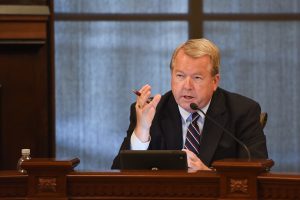 On Friday, Governor Pritzker signed important legislation I sponsored this year that provides units of government with greater opportunities and flexibility to obtain more favorable returns on invested reserve funds. The new provisions apply to all units of government, from the State of Illinois, down to counties, municipalities, townships, and smaller local units such as schools, park districts, and libraries. It’s one small way that we can help units of government grow their revenues internally without having to go to taxpayers.
On Friday, Governor Pritzker signed important legislation I sponsored this year that provides units of government with greater opportunities and flexibility to obtain more favorable returns on invested reserve funds. The new provisions apply to all units of government, from the State of Illinois, down to counties, municipalities, townships, and smaller local units such as schools, park districts, and libraries. It’s one small way that we can help units of government grow their revenues internally without having to go to taxpayers.
Senate Bill 273 was negotiated between the Illinois Association of Park Districts and the Illinois Treasurer’s Office. I want to thank Treasurer Frerichs and his staff for their assistance in helping craft language that ensures governmental units have the widest level of choices possible for their investments, while also protecting taxpayers for overly-aggressive and risky investments. SB 273 received unanimous approval in the Senate and House, and its provisions take effect immediately.
New law perpetuates failures of the FOID system
On August 2, the Governor signed legislation that was hailed as common-sense gun control legislation that will save lives. The “Fix the FOID” bill was also touted as a solution to the outrageous backlog of FOID and CCL applications and renewals that currently exist. It continues to frustrate me when each new gun control bill does very little to address the root causes of gun violence and deaths in our state, while slowly increasing regulations and red tape for lawful gun owners.
House Bill 562, as approved and signed into law:
- Does NOT increase penalties for repeat offenders
- Does NOT address crimes committed by people not eligible for a FOID Card
- Does NOT address gang violence
- Does NOT address gun violence committed with guns obtained illegally
- Does NOT immediately address FOID and CCL backlog problems
With regard to lawful gun owners, HB 562 adds new requirements, including:
- Requiring person-to-person transactions (such as a father passing a hunting rifle down to a child) to take place through a licensed dealer or through online validation by ISP (includes new fees)
- Requiring a transferee to provide a record of a private transfer of a firearm to the Federal Firearms Listings within 10 days of sale, and requires FFLs to keep the record of transfer for 20 years
- On the demand of a peace officer, transferees have to identify the FFL dealer maintaining the transfer record or face the possibility of a Class A misdemeanor, and the seller has to maintain a record of transfer for 10 years
- Requiring an individual to submit fingerprints in order to receive automatic renewal of their FOID card and CCL license
Most changes in House Bill 562 take effect Jan. 1, 2022 with the exception of the universal background checks, which will take effect in January 2024.
Local fire departments can apply for grants
The Office of the State Fire Marshal is currently accepting applications for a one-time Illinois Fire Department COVID Assistance Grant opportunity for eligible volunteer and combination fire departments. Applications are due by Aug. 13, and funds are expected to be awarded in October. For additional information, click here.
